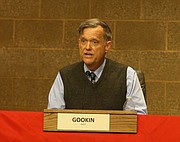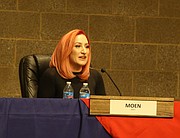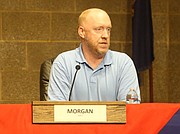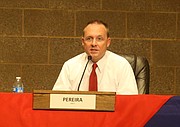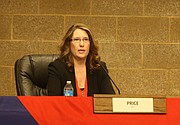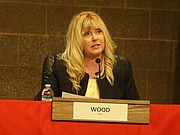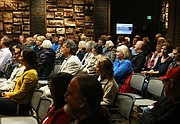Outsiders vs. incumbents
Craig Northrup Staff Writer | Hagadone News Network | UPDATED 6 years, 2 months AGO
Coeur d’Alene City Council hopefuls paired off Thursday night, giving voters an opportunity to weigh their choices during the Coeur d’Alene Press-sponsored Candidate Forum.
Managing Editor Mike Patrick emcee’d the event and laid down the ground rules: Each candidate received two minutes for opening remarks and two minutes for closing remarks. In between, each candidate was asked identical questions among others seeking the same Council seat by two moderators, Assistant Managing Editor Andy Obermueller and reporter Devin Weeks.
With other candidates sequestered, Christie Wood and Elaine Price squared off first.
Seat 1: Elaine Price vs. Christie Wood
The two candidates immediately distinguished themselves through their backgrounds as they vie for the retiring Ron Edinger’s seat. Wood began by highlighting her decades of public service.
“I’ve spent the majority of my adult life in public service in one form or another,” Wood told the crowd at the Coeur d’Alene Public Library. “I’ve served my country in the United States Air Force as a law enforcement specialist, and I’ve spent 26 years with the City of Coeur d’Alene as a police officer, retiring as a detective sergeant in 2015. I know this City pretty well.”
Price introduced herself to the crowd by separating herself as someone representing middle-class citizens.
“I look at Coeur d’Alene as having opportunities,” she said, “and I want to give a fresh voice to finding solutions to those opportunities. I don’t have a political background, but I learn quickly. And I feel that if I have a passion for this city, I could sit on the sidelines and just complain about what’s going on in this city, but I decided to throw my hat in the ring to see if I could make a difference. I’m trying to be a voice nobody else has heard already. I’m trying to be a representative of all the citizens of Coeur d’Alene.”
Wood and Price first addressed the question of City employees earning more than their counterparts in other communities. Wood said the City needs to pay employees enough to incentivize them to stay, rather than leave for similar positions elsewhere.
“If you don’t have qualified, good employees, the City is going to suffer,” Wood said. “Whether it’s losing our leaf pick-up or whether it’s not having the most qualified police force, the citizens do feel it.”
Both Price and Wood were given a choice for recovery efforts on East Sherman: urban renewal or private investment. Price pushed for private investment, questioning urban renewal’s transparency while saying the government had no place in the business of running a business. Wood said a combination of both City-led urban renewal and private business was key to revitalizing the area.
“Certainly the City has a role,” Wood said. “There is a feeling sometimes that urban renewal is not transparent, but I have certainly worked with a number of [urban renewal projects] that have been very successful in this city, so I wouldn’t rule out urban renewal. I think it needs a lot of oversight, because there is a possibility of projects not going the way they should go.”
Both candidates were asked to imagine a hypothetical scenario where each were Council members on June 5, 2013, when Coeur d’Alene passed an ordinance prohibiting discrimination in employment, housing and public accommodation against lesbian, gay, bi-sexual and transgendered residents. Obermueller asked each candidate how they would have voted. Wood gave her full-throated support to pass the ordinance, recalling how her group—the Kootenai County Task Force on Human Relations, of which she is now president—was a driving force behind the ordinance.
“I don’t think human rights are a liberal or a conservative issue,” she said. “I think it’s a moral issue. We worked very hard to protect people so they all feel safe in the City of Coeur d’Alene ... I’m very proud of the City of Coeur d’Alene for putting those protections in place for vulnerable.”
Price agreed, saying she would have voted to approve the ordinance, but she held reservations about a law requiring fair treatment as one law too many.
“I don’t think the government should have to tell us to treat people a certain way,” she said. “It should be a human reaction to treat people a certain way. I do believe less government is the best government, and that we shouldn’t have to be ordinanced into being nice and being kind to people. I would have voted for it, because it was the right thing to do.”
When asked about how they would manage growth, both candidates relied on the City’s comprehensive plan, something Coeur d’Alene has been working on for years, as the guide its Council should take.
“We don’t have a clear plan in place for the developers,” Price challenged. “So they feel confident to do what they want to do versus what’s necessarily right for the community. I think if we give them a clear understanding of what direction we want to see the City go, what growth we want to see, make sure they understand we care about all of our citizens, and that everybody’s property rights are important...”
Wood added that public input as the community grows is critical to address quality-of-life concerns. During her closing remarks, Wood described herself as someone with energy, experience and a willingness to “roll up my sleeves.”
Price said in her closing remarks how she was not a polished politician but a middle-class candidate who wants to represent all of Coeur d’Alene.
“I don’t have all the answers, and I’m willing to admit I don’t have all the answers,” she said. “But I’m also willing to admit I’ll work hard to find solutions. I’ll listen to everybody, and I’ll do my best to represent all the citizens of Coeur d’Alene.”
Seat 3: Dan Gookin vs. Michael Pereira
Author and incumbent Gookin described himself as a fiscal hawk who pushes for transparency, budget cuts instead of taxes, and the preservation of established neighborhoods. His challenger, Pereira, said his background as a lifelong resident and successful businessman in the construction industry sharpened his analytical and forward-thinking style, providing a fresh perspective as an alternative to Gookin’s re-election.
“I entered this race because I want to serve the people in our city,” Pereira said. “I pride myself on being fiscally conservative, and I have been involved in the community for many years, creating many strong connections and relationships. I believe community involvement is very important, and giving back is a priority for me.”
When Weeks asked both candidates how they would have handled the parking dilemma that plagued the Council earlier this year with public outcries, Pereira said his history of good working relationships would have pre-empted the decision to take away two-hour free parking. Gookin said his minority vote in opposition of parking fees showed exactly where he stood, adding the City Council should re-consider the removal of two-hour free parking.
“I was very happy the Mayor stepped up to address the concerns of the citizens,” Gookin said, referring to Steve Widmyer’s plan to establish parking passes for locals. “People were upset. I was there at that meeting, and I voted against those fee increases, primarily for parking. The thing that annoyed me even more than taking away the two-hour parking was that they were going to charge to park here at City Hall. I don’t think anyone should have to pay to go to a public meeting or to pay their utility bill.”
When the question of urban renewal versus private business along East Sherman was posed to Gookin and Pereira, Gookin criticized the delay finalizing the comprehensive plan, while saying the best way to revitalize a community was for the government to get out of the way.
“The City has been paying attention to East Sherman after ignoring it for the longest time, and now it’s practically an obsession,” Gookin said. “...I don’t want to use urban renewal unless they can demonstrate somehow that tool can be effective.”
Pereira said East Sherman’s future could one day mimic its past, with the help of private industry.
“If you look back in history,” Pereira recalled, “East Sherman was bustling. Today, it’s not bustling from end to end. It’s been a topic of conversation for a long time. I believe private industry is the best way to go. If private industry could come in and make it bustle again from end to end, that’s the best way to go.”
The two candidates also saw eye-to-eye on growth and employee pay, saying that keeping City employees was vital to maintaining quality services.
Seat 5: Dan English vs. Lacey Moen vs. Tom Morgan
Two of the three candidates challenging incumbent English were present, with Roger Huntman choosing not to attend. English, seeking his second consecutive and third total term on the Council presented himself as a people-centered volunteer, while Moen and Morgan both described themselves as insiders.
“This is the first time I’ve attempted anything like this,” Morgan said.
When confronted with the discrimination hypothetical, all three candidates cheered the passage of the ordinance protecting LGBTQ rights.
“No one should ever be discriminated against for any reason,” Morgan said. “I would have been fully in support of that...In my lifetime, we’ve seen some discrimination. It was a very small group, and it was absolutely not what Coeur d’Alene was about or has ever been about.”
English and Morgan both described growth as complicated, with English calling the issue a point of pressure and tension, with English pointing out how parking is the most noticeable symptom. Morgan called the issue difficult and admitted he had no answer, saying solving the problem needs more than a minute and more than one mind at work.
While English and Morgan both lamented the issues growth brings, Moen gave perhaps the highlight answer of the night, however, when she said she would welcome the challenge growth brings, all with a smile on her face.
“I love that this is a question that’s happening right now,” she said. “I love that Coeur d’Alene is so desired, that people are moving here,” she said. “I think this is a situation of, ‘We’re doing their jobs right.’ Twenty years ago, we were trying to figure out how to get people here, and now they’re here, and now we’re trying to figure out where to put them. I think there are a lot of great solutions.”
Moen added the growth solution requires neighbors to put their heads together as much as City officials should.
“I think there are things the City can do,” she said, “but I think there are a lot of things that we can do to help each other.”
Election Day is Tuesday, Nov. 5.
ARTICLES BY CRAIG NORTHRUP STAFF WRITER

Legislature gives Green the boot
John Green, in the midst of his first term representing Rathdrum, was expelled from the Idaho Legislature early Thursday afternoon.

No fast lane for grocery tax relief
This week saw an end to three bills devoted to helping residents pay for their groceries, dimming Gov. Brad Little’s hopes to shepherd relief to local shoppers.

Grocery credit bill stewing in Idaho House slow cooker
A bill that would increase the tax credit Idahoans receive to help offset the cost of groceries is tentatively scheduled for a vote in the state House today, but postponing that bill is becoming the norm, rather than the exception.









